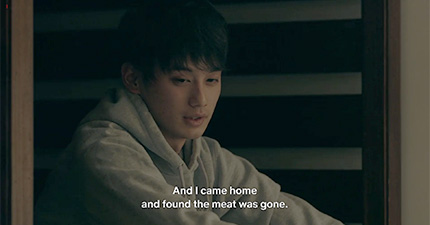Trigger warning: this article discusses violence, gendered violence, racial violence, and sexual violence. It analyzes how violence is narrated by states invested in policing.
In the winter of 2017, Song Yang, also called Sisi, fell four stories to her death in Flushing, Queens during a police raid. The Moon was in Capricorn that night. Prior to this, Song Yang had been raped while in police custody. Because there isn’t video footage of what happened during her death, people believe a variety of things. She hadn’t expressed suicidal intent prior to the fall but she may have fallen off the balcony. Someone could have pushed her. We don’t know. All we know is that she fell four stories and that the building was full of cops when she did.
No one really knew about Song Yang or her death until 2019. Her family didn’t let it go. Her brother and mother came to the United States and asked questions for two years before any major news outlet ran the story.
The publicizing of Song Yang’s death catapulted a series of street protests against police violence. Red Canary Song was formed around that time and led many of the actions. People were talking about the reasons why immigrant women fear the cops so much.
In the spring of 2021, Robert Aaron Long went on a shooting spree at two spas and a massage parlor in Atlanta, Georgia. This time, the response was different. This shooting became part of a larger national conversation about anti-Asian hate crimes that were increasing in part due to American rhetoric around scapegoating and the pandemic. This was one year after the George Floyd protests. Red Canary Song was still a huge part of the conversation but so were other actors. Namely, community leaders and politicians used the Stop Asian Hate movement, a movement that initially imagined alternatives to policing by inviting younger people to walk elders around our neighborhood, to push back against bail reform. Around the same time, Christina Yuna Lee and Michelle Go were also murdered in New York City.
We never learned how Song Yang died because there was no footage. Two years passed before the story was reported. In contrast, the stories of Christina Yuna Lee and Michelle Go, both killed by Black men, filled every publication for weeks. There was video footage of Lee being followed, interviews with the man who pushed Go into the subway tracks, and footage of arrests being made.
All of these killings are tragic. There’s a horror around any kind of murder. It’s just that there is a noticeable difference in the storytelling around the events. This difference is important to note when we are trying to come together to find a solution to violence.
Recently, Kamala Harris put out a video describing the Biden Administration’s tactics for dealing with islamophobia. What is interesting about the video is that, in its entirety, she never describes what islamophobia is. She doesn’t mention the ways that the state’s rhetoric around terrorism and “domestic threats” contributes significantly to islamophobia and she never mentions the dangers of rising nationalism. She treats islamophobia as some kind of spontaneously arising surge devoid of context. She claims that the Biden Administration is prepared to deal with islamophobia because of its existing policies on Stop Asian Hate.
What are the strategies presented by Harris? It’s increased reporting (to cops), faster investigation (by cops), and more funding for protecting houses of worship (more funding to cops).
At the same time, more quietly, the FBI has started to visit mosques and homes and detain Palestinian Americans under Biden’s authority. Human rights attorney Azadeh Shahshahani says, “We get contacted by community members saying that the FBI has come to their house without any type of prior notice or any type of prior suspicion or any reason whatsoever, other than the fact that they’re Muslim or Palestinian or Iranian.” This isn’t the Bush years of the early 2000s. This is happening under the Biden administration in 2023.
In her essay Appropriating Rape: Sexual Violence in Cinematic Narratives of the Sino-Japanese War, Maria Magdalena Bastida Antich describes “the dangers of erasing the experiences of pain and trauma of the victims and survivors of sexual violence when instrumentalising images of wartime rape as part of a political discourse of the nation.” She writes that there are usually two types of national heroism available to women: “the patriotic motherly figure that complies with traditional/local notions of female chastity, and the comfort woman that chooses to sacrifice herself for the nation.”
The usage of sexual martyrdom for nationalist purposes is not new. In fact, it is very old. Wars were often compared to rapes in many ancient societies. Antich’s essay is about World War II and about films made after World War II. I’m very familiar with the genre of films that Antich is talking about because I watched several while growing up. There’s a certain genre of Chinese films about World War II that will always feature harrowing Japanese war crimes and very often these war crimes will be sexual in nature. Women are tied up and raped to death with a gun and men are penetrated with swords. The Rape of Nanjing is called a rape in part because around 20,000 people were actually raped during the invasion. When you look into the injustices suffered by comfort women, you are confronted with detailed descriptions of violence with many women recounting to the world what their genitals felt like during the assaults they lived through.
Images of sexual violence are broadcast loudly when it benefits the nation to do so. Chinese women are reminded of their vulnerability to rape when China wants to increase nationalism. Sometimes, I see this happening and I wonder if there is some perverse enjoyment that people get out of this type of retraumatization. The nation wants to be a hero but a hero needs a victim to pretend to rescue. It’s a suffocating story, one that repeats and repeats.
In her new book Doppelganger, Naomi Klein describes her visit to Gaza. She was held up at a checkpoint for hours upon her exit during which an IDF soldier spoke to her husband in private, insinuating that he had exposed his wife to some threat of sexual violence by allowing her to venture into the strip. The visit was otherwise peaceful with Klein detailing a meal she shared with a Palestinian family.
In contrast, sexual violence is usually dismissed altogether when publicizing it does not benefit the state. Chinese women who suffer brutal domestic violence are usually told that they need to make the marriage work when they try to get a divorce even as images of their trauma by the Japanese are used in national propaganda. People are punished socially, financially, and physically when they try to leave abusive relationships. Black and indigenous women are often assaulted by cops and their stories remain mostly unreported. The sexual violence that men suffer, which may be just as frequent as what women suffer due to underreporting, is mostly unacknowledged. The sexual violence that trans people suffer is usually blamed on the victims themselves. The kidnappings and sexual assaults of Palestinian boys by IDF soldiers, which have been recorded for years, are ignored by the Israeli government.
Violence that is coherent to the state is narrated explicitly and repetitively. Violence that is incomprehensible or detrimental to the state is unacknowledged, discounted, and ignored. Sometimes, the victims are even punished.
Neither situation is great. Survivors of sexual violence don’t want our traumas to be used as part of some nationalistic excitement. That’s sick. Those who live through sexual violence are not perpetual victims who need to be saved by a police state. We are not political pawns used for geopolitical games and our traumas are not convenient fillers for outrage porn. We also don’t want to be ignored, dismissed, and vilified. We are not victims, villains, heroes, or ghosts. Suffering violence does not transform someone into a cartoon cutout of a human being. It also doesn’t make someone disappear.
Nationalism dismisses the reality of trauma while using images of victimhood to build consent. Anyone who is survivor focused, anyone who is honest about caring about survivors, must look at this and describe it in our own language.
Survivors want one thing—we want to find a realistic and effective solution to violence. Some of us, not all and this is understandable, seek an accurate understanding of why rape happens because we want a solution. Both the criminalization of sexual assault survivors and the idealization of sexual martyrdom when it benefits the nation distorts the accuracy of our perception of sexual violence. Sexual violence is no longer an event that has a beginning and an end but some eternal fact of violence that the state uses to justify endless policing and border patrol.
But Song Yang was killed by the police. If she jumped, then she did so because she didn’t want to be arrested and raped by a cop again. If she fell, it was because she was hiding on the balcony out of fear of the police raid.
The thing is, an end to violence is both possible and legitimate. Violence is something that someone does to someone else, not some kind of eternal and unchangeable fact of human nature. It is possible to live as a person and to not rape. It is reasonable to believe in and want a solution to violence, sexual and otherwise.
No one believes that violence in resistance is a solution in and of itself but we sometimes justify the way past liberation movements have used violence as a means in their struggles towards justice. I’m not so sure about this and I know that people will disagree. That’s fine. I’ve heard countless stories about imperialist soliders who rape but I’ve also heard secret stories about socialist fighters raping rural women. I believe that violence is the colonizer’s only tool and that, in resistance movements, we haven’t achieved the full gender equality needed to become aware of all of our tools. Discussing the role of violence in resistance gives me a feeling of futility when oppressed people are always portrayed to be more violent. We have to be honest about this—oppressed people are not inherently violent. Oppressed people are also not perfectly peaceful victims, ready to be idealized. Oppressed people are just people and can be just as daring, cruel, loving, and tired as anyone else.
As we make attempt to portray sexual violence accurately, we may find a couple things. We may find that borders are not sanctuaries, that police is not safety, and that war is not protection. We might find that distorting sexual violence does not benefit survivors. We might find that some honesty in the narration of sexual violence can lead to solutions and that truth alone is what cuts through the undignified illusions scattered by fragmented and unrecognized trauma. We might find that honesty itself is the most effective act of love. We might find the means to finally have a conversation about the reality of resistance without idealization, without criminalization, and without distortion.
1 of 188
>>>


